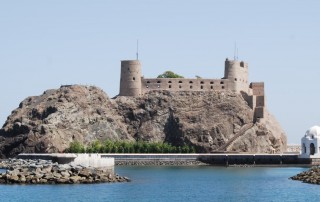The Middle East and the United States: Continuing Challenges and threats in the Next Decade
December 1, 2022
Dr. Emile Nakhleh
The Middle East in 2021-2022 has experienced major developments and faced many challenges, politically, economically, militarily, and socially. In addition to the ongoing disastrous war in Yemen, the protests in Iran, and the massive human rights violations across the region, the Middle East has been affected by Russia’s war in Ukraine, economically and politically. Several Middle Eastern states are on the verge of collapse, including Yemen, Syria, and Lebanon. Bloody confrontations between Israelis and Palestinians in the Occupied Territories continue with no resolution in sight and will be exacerbated by the resurgence of ultra-right politics in Israel following the November 1 elections.
The Middle East has also seen a disconcerting rise in poverty, unemployment, corruption, serious environmental degradation, and distrust of political and social institutions. US policy in the region, especially with Saudi Arabia, in being tested and challenged. Tribal illiberal nationalism, much like in the United States and other countries, is also on the rise in the Middle East. Yet some new alliances and relations have been forming among several states in the region. Many of these developments, including terrorism, pose a challenge to American interests in the region. Understanding the Middle East is best achieved through five major themes: Geography, Religion, Natural Resources (oil and natural gas), Relations with Foreign Powers, and Governance (Rulers and Ruled).
 Dr. Nakhleh is a former Senior Intelligence Service (SIS) Officer (CIA), a former Research Professor and Director, GNSPI (UNM), a Founding Director, Political Islam Strategic Analysis Program (CIA), a Founding Director, Global and National Security Policy Institute (UNM), a Life Member, Council on Foreign Relations, a Consultant on the Middle East, political Islam, radicalization, terrorism, and intelligence. He has published frequently on these issues, been awarded several senior commendations and distinguished medals for his service, and been a Senior Fulbright Scholar in Bahrain and Israel. Dr Nakhleh has been a frequent speaker for the Santa Fe World Affairs Forum. We welcome him back!
Dr. Nakhleh is a former Senior Intelligence Service (SIS) Officer (CIA), a former Research Professor and Director, GNSPI (UNM), a Founding Director, Political Islam Strategic Analysis Program (CIA), a Founding Director, Global and National Security Policy Institute (UNM), a Life Member, Council on Foreign Relations, a Consultant on the Middle East, political Islam, radicalization, terrorism, and intelligence. He has published frequently on these issues, been awarded several senior commendations and distinguished medals for his service, and been a Senior Fulbright Scholar in Bahrain and Israel. Dr Nakhleh has been a frequent speaker for the Santa Fe World Affairs Forum. We welcome him back!
Location: The SFWAF Program will be in the SFCC Board Room (#223) which is in the West Wing (Administration building) of the Santa Fe Community College.
The SFWAF program is from 12:00 noon – 2:00 pm.
Cost for the SFWAF lunch event is $25 for members and $35 for nonmembers.
You may pay by check made out to SFWAF and mailed to The Santa Fe World Affairs Forum, Santa Fe, PO Box 31965, NM 87594 or with a credit card using our Paypal account. Please indicate on your check or if using Paypal please note in “add special instructions to the seller” that your payment is for the Thursday, December 1, 2022 program. If you are not a member please also include your best contact information. If you are interested in membership, please email us.
Payment for this program is non-refundable after Friday November 25, 2022 if you are unable to attend. We strongly prefer that payment be made by Paypal or check postmarked by Friday November 25, 2022 at the latest to facilitate check in. It is also very helpful if you are sending a check to email us at sfwaforum@outlook.com to let us know you plan to attend.
If you are not a member but interested in membership, please see our membership page and email sfwaforum@outlook.com for additional information.
Because we are a 501(c)(3) organization, dues and contributions are tax deductible.
For pricing and reservations, click here: https://sfwaf.org/payment/



 Few Americans know much about Oman, a small sultanate located on the southeast coast of the Persian Gulf between Saudi Arabia and Iran. Yet Oman hosts American military forces on three Omani bases through a Facilities Access Agreement and its unbroken alliance with the US dates from 1790.
Few Americans know much about Oman, a small sultanate located on the southeast coast of the Persian Gulf between Saudi Arabia and Iran. Yet Oman hosts American military forces on three Omani bases through a Facilities Access Agreement and its unbroken alliance with the US dates from 1790. Although Omani society is historically tribal, Sultan Qaboos has been able to construct an effective national consensus, in which Omani loyalty transcends tribe. Oman is also now highly urbanized and since 2014, foreign migrants represent over 43% of the population working primarily in the oil industry. Yet in addition to encouraging the growth of the petroleum sector, the Sultan has also initiated a program of “Omanization,” aimed at reducing the country’s reliance on hydrocarbon production, increasing private investment, and replacing expatriate labor with trained Omanis.
Although Omani society is historically tribal, Sultan Qaboos has been able to construct an effective national consensus, in which Omani loyalty transcends tribe. Oman is also now highly urbanized and since 2014, foreign migrants represent over 43% of the population working primarily in the oil industry. Yet in addition to encouraging the growth of the petroleum sector, the Sultan has also initiated a program of “Omanization,” aimed at reducing the country’s reliance on hydrocarbon production, increasing private investment, and replacing expatriate labor with trained Omanis.


